Apache Stronghold turns to Supreme Court to save Oak Flat


In Arizona, the Tonto National Forest is a common destination for hiking and camping for families looking to get a weekend getaway. However, one of the most sacred sites in the San Carlos Apache’s cosmology sits along the rolling hills near the Devil’s canyon. The site boasts picturesque views of the desert and mountains that have stood the test of time. Over the past ten years, the prospect of opening a copper mine has potentially threatened the entire landscape, with blueprints showing a 2 mile divot where Oak Flat mountains lie. Attempts to block the federal government’s transfer of land to the Rio Tinto Oil Company have temporarily suspended construction of the copper mine due to lengthy lawsuits by Native American and environmental activists. The Rio Tinto Oil Company sparked international outrage in 2016 when a mining blast destroyed a 40,000 year old Aboriginal rock shelter in Australia.

Apache scholar activist and scholar Dr. Wendsler Nosie Sr. issued a statement saying, “Oak Flat is the heart and soul of the Apache — the place where generations of my people have come to connect with our Creator and perform our most sacred ceremonies.” In 2014, Arizona Senator John Mccain tacked on a last-minute addition to a must-pass defense bill that authorized the U.S. Forest Service to trade the 2,200 sq acre site to British-Australian mining moguls. The project has been continuously denied by legislative blocks from Native communities and environment activists. During the end of Trump’s tenure in January 2021, the U.S. forest service published a final environmental impact report and draft decision allowing the land transfer to a mining company within a 60-day window. In response, a non-profit organization called the Apache Stronghold filed a lawsuit against the United States in Federal Court. Ultimately, their request to block the land transfer was denied on the premise that the Apache stronghold is not a federally recognized tribe. However, the Apache stronghold argues that through an 1852 treaty stating the Apache people are entitled to “securing permanent prosperity and happiness’ ‘ and the Religious Freedom Restoration Act they are entitled to block the land transfer. Moreover, the federal recognition system enables tribal nations to attain government funds only when they are recognized. The United States has an infamous history of terminating and withholding tribal nation recognition status, and there was even a period of time where the government sought to terminate tribal recognition as a whole. In the initial lawsuit filed by the Apache Stronghold with the United States , a federal judge in Arizona denied the request to block the land transfer on the premise that “the court cannot infer an enforceable trust duty as to any individual Indians.”After a federal judge denied the request to block the land transfer, the Apache Stronghold filed an appeal with the 9th circuit in hopes of protecting the Oak Flat site from being demolished.

On multiple occasions, the 9th circuit of appeals rejected the request to block the transfer of federal lands with razor thin decision margins. In 2024, the Apache Stronghold unsuccessfully asked all 29 circuit court judges to rehear the case. With sparse legal options left, the collective of Apache activists is going to the Supreme Court as the last hope for saving the most sacred site in their religion. In America, Indigenous religious expression has historically been erased and suppressed through forced assimilation policy. In 1883, there was a crime code enacted to ban Indigenous dances and ceremonies. It wasn’t until 1978 that Indigenous religious expression was afforded legal protections through the American Indian Religious Freedom Act. Considering the direct sustained efforts to eradicate American Indian religious freedoms in the past, what makes the destruction of Oak Flat any different? Moreover, there are laws in place to protect Indigenous religious freedoms like the American Indian Religious Freedom Act. “If this decision holds up, then the law offers virtually no protection to Native American place-based religious exercise,” says Luke Goodrich, an attorney at Becket Law who represents Apache Stronghold in court. “As a practical matter, this sounds the death knell for all Native American religious practices that are tied to federal lands.”

This case highlights the complex relationship between tribal nations and the federal government. Tribal governments are supposed to be a completely sovereign entity that have a government to government relationship with the United States. However, by selectively granting tribal recognition based on a colonial-framework, threatening to destroy sacred religious sites like Oak Flat, and strong-arming tribal land by placing it federal trusts, the United States maintains a domestic-dependent relationship with tribal nations that “resembles that of a ward to its guardian” according to Justice John Marshall in the 1832 Supreme Court Case Cherokee V. Georgia. When the United States maintains an imposed paternalistic relationship with tribal nations to this day, it poses serious challenges to advocating for religious freedoms.
The Oak Flat case serves as a reminder of the continuous challenges to Indigenous sovereignty by the federal government. Ultimately, the Apache Stronghold vs. US case brings up a much larger conversation around environmental stewardship and the lasting impacts of federal Indian policy on Native communities. The fate of the site’s existence lies in whether the Supreme Court decides to hear the case or not. If the Supreme Court rejects the case, the land will be transferred to the Rio Tinto Oil Company.

Further reads
- https://www.npr.org/2021/04/17/988123599/unrecognized-tribes-struggle-without-federal-aide-during-pandemic
- https://nativenewsonline.net/currents/federal-judge-rejects-apache-stronghold-s-request-to-halt-transfer-sacred-oak-flat-because-they-are-a-sovereign-nation
- https://narf.org/apache-oak-flat/
- https://www.knau.org/knau-and-arizona-news/2024-03-04/a-us-appeals-court-ruling-could-allow-mine-development-on-oak-flat-land-sacred-to-apaches
- https://www.azfamily.com/2024/03/29/proposed-copper-mine-east-phoenix-would-obliterate-sacred-native-land-activists-say/
- https://www.sierraclub.org/michael-brune/2020/12/save-oak-flat
- https://www.cambridge.org/core/journals/journal-of-law-and-religion/article/fighting-for-oak-flat-western-apaches-and-american-religious-freedom/6B574B3E5CDE929BC9F200692A5430F8
- https://scholarworks.iu.edu/journals/index.php/jsriue/article/view/33984
- https://fore.yale.edu/news/Why-Oak-Flat-in-Arizona-is-a-sacred-space-for-the-Apache-and-other-Native-Americans
- https://www.academia.edu/78556322/Decolonizing_Oak_Flat_Apache_Strongholds_Placebased_Temporal_and_Mnemonic_Dissensus_at_Public_Hearings
